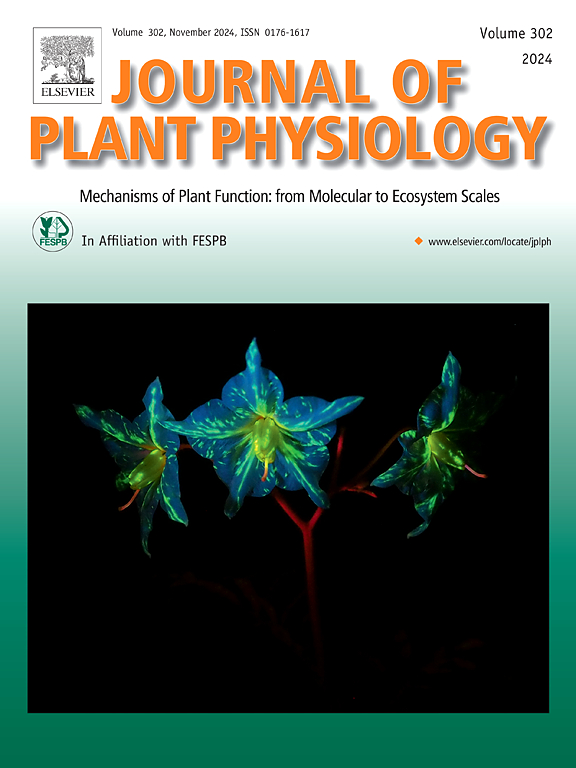糖转运体GmSWEET48影响大豆籽粒产量和组成
IF 4.1
3区 生物学
Q1 PLANT SCIENCES
引用次数: 0
摘要
在种子发育的早期阶段,小胚胎从发育中的种子的液体胚乳中吸收大量的糖。缺糖可导致严重的种子流产和产量损失。然而,影响糖转运和作物产量的关键因素在很大程度上仍然未知。在这项工作中,我们发现了一个质膜定位的糖转运蛋白GmSWEET48,它在发育中的大豆种子中高度表达。异种表达表明,GmSWEET48在酵母系统中运输果糖和葡萄糖,并在爪蟾卵母细胞中表现出14c标记的蔗糖内流和外排活性。过表达GmSWEET48降低了种子中的蔗糖和油脂含量,但提高了种子中的蛋白质水平,促进了种子产量。综上所述,GmSWEET48调控了种子发育早期的糖转运,最终调控了种子的产量和组成。本文章由计算机程序翻译,如有差异,请以英文原文为准。
The sugar transporter GmSWEET48 impacts seed yield and composition of soybean
During the early stages of seed development, the small embryo receives large amounts of sugar from the liquid endosperm of the developing seed. A sugar deficit can lead to severe seed abortion and yield loss. However, the key factors influencing sugar transport and crop yield remain largely unknown. In this work, we identified a plasma membrane-localized sugar transporter, GmSWEET48, that was highly expressed in developing soybean seeds. Heterologous expression showed that GmSWEET48 transported fructose and glucose in yeast systems and exhibited 14C-labeled sucrose influx and efflux activities in Xenopus oocytes. Overexpression of GmSWEET48 decreased the levels of sucrose and oil but increased protein levels in seeds and promoted seed yield. In conclusion, GmSWEET48 regulates sugar transport during early seed development and ultimately regulates seed yield and composition.
求助全文
通过发布文献求助,成功后即可免费获取论文全文。
去求助
来源期刊

Journal of plant physiology
生物-植物科学
CiteScore
7.20
自引率
4.70%
发文量
196
审稿时长
32 days
期刊介绍:
The Journal of Plant Physiology is a broad-spectrum journal that welcomes high-quality submissions in all major areas of plant physiology, including plant biochemistry, functional biotechnology, computational and synthetic plant biology, growth and development, photosynthesis and respiration, transport and translocation, plant-microbe interactions, biotic and abiotic stress. Studies are welcome at all levels of integration ranging from molecules and cells to organisms and their environments and are expected to use state-of-the-art methodologies. Pure gene expression studies are not within the focus of our journal. To be considered for publication, papers must significantly contribute to the mechanistic understanding of physiological processes, and not be merely descriptive, or confirmatory of previous results. We encourage the submission of papers that explore the physiology of non-model as well as accepted model species and those that bridge basic and applied research. For instance, studies on agricultural plants that show new physiological mechanisms to improve agricultural efficiency are welcome. Studies performed under uncontrolled situations (e.g. field conditions) not providing mechanistic insight will not be considered for publication.
The Journal of Plant Physiology publishes several types of articles: Original Research Articles, Reviews, Perspectives Articles, and Short Communications. Reviews and Perspectives will be solicited by the Editors; unsolicited reviews are also welcome but only from authors with a strong track record in the field of the review. Original research papers comprise the majority of published contributions.
 求助内容:
求助内容: 应助结果提醒方式:
应助结果提醒方式:


